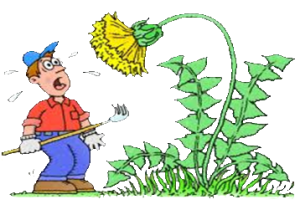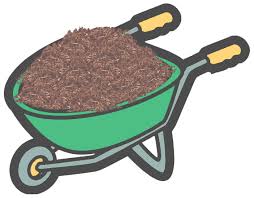
Perfectly striped lawn
In my book, Garden Renovation: Transform Your Yard into the Garden of Your Dreams, I discuss the fact that at too many homes, the default landscape is lawn. It is supposedly easier to maintain than landscape beds (MYTH!) but, for sure, it is incredibly boring as well as an ecological disaster.
In one of the horticultural newsletters I receive regularly or on someone else’s blog, I read a hilarious discussion called “God’s Take on Lawns” and want to share it with you. It was written for and printed in El Ojo Del Lago News of Guadalajara, Mexico, Mexico’s leading English language publication several years ago but not much has changed. I quote it below:
Imagine a conversation the Creator might have with St. Francis on the subject of lawns…
 God: Frank, you know all about gardens and nature. What is the world is going on down there in the Midwest? What happened to the dandelions, violets, thistle and stuff I started eons ago? I had a perfect, no-maintenance garden plan. Those plants grow in any type of soil, withstand drought and multiply with abandon. The nectar from the long-lasting blossoms attracts butterflies, honeybees and flocks of songbirds. I expected to see a vast garden of colors by now. But all I see are these green rectangles.
God: Frank, you know all about gardens and nature. What is the world is going on down there in the Midwest? What happened to the dandelions, violets, thistle and stuff I started eons ago? I had a perfect, no-maintenance garden plan. Those plants grow in any type of soil, withstand drought and multiply with abandon. The nectar from the long-lasting blossoms attracts butterflies, honeybees and flocks of songbirds. I expected to see a vast garden of colors by now. But all I see are these green rectangles.
St. Francis: It’s the tribe that settled there, Sir. The Suburbanites. They started calling your flowers “weeds” and went to great lengths to kill them and replace them with grass.
God: Grass? But it’s so boring. It’s not colorful. It doesn’t attract butterflies, birds and bees, only grubs and sod worms. It’s temperamental with temperatures. Do these Suburbanites really want all that grass growing there?
St. Francis: Apparently so. They go to great pains to grow it and keep it green. They begin each spring by fertilizing grass and poisoning any other plants that crop up in the lawn.
God: The spring rains and warm weather probably make grass grow really fast. That must make the Suburbanites happy.
St. Francis: Apparently not, Lord. As soon as it grows a little, they cut it-sometimes twice a week.
God: They cut it? Do they bale it like hay?
St. Francis: No, sir. Just the opposite. They pay to throw it away.

Riding mower
GOD: Now let me get this straight. They fertilize grass so when it does grow they cut it off and pay to throw it away?
St. Francis: Yes, Sir.
God: These Suburbanites must be relieved in the summer when we cut back on the rain and turn up the heat. That surely slows the growth and saves them a lot of work.
St. Francis: You aren’t going to believe this! When the grass stops growing so fast, they drag out the hoses and pay more money to water it so they can continue to mow it and pay to get rid of it.
God: What nonsense! At least they kept some of the trees. That was a sheer stroke of genius, if I do say so myself. The trees grow leaves in the spring to provide beauty and shade in the summer. In the autumn, they fall to the ground and form a natural blanket to keep moisture in the soil and protect the trees and shrub. Plus, if they rot, the leaves form compost to enhance the soil. It’s the natural circle of life.
St. Francis: You’d better sit down. The Suburbanites have drawn a new circle. As soon as the leaves fall, they rake them into great piles and pay to have them hauled away.
God: No. What do they do to protect the shrub and tree roots in the winter and keep the soil moist and loose?
 St. Francis: After throwing away the leaves, they go out and buy something they call mulch. They haul it home and spread it around in place of the leaves.
St. Francis: After throwing away the leaves, they go out and buy something they call mulch. They haul it home and spread it around in place of the leaves.
God: And where do they get this mulch?
St. Francis: They cut down trees and grind them up to make mulch.
God: I don’t want to think about this anymore. St. Catherine, you’re in charge of the Arts. What movie have you scheduled for us tonight?
St. Catherine: Dumb and Dumber, Sir. It’s a really stupid movie about…
God: Never mind, I think I just heard the whole story from St. Francis.
The perpetuation of the myth that lawn must be perfect needs to end. Let’s see if we can contribute to its demise.


1 Comment